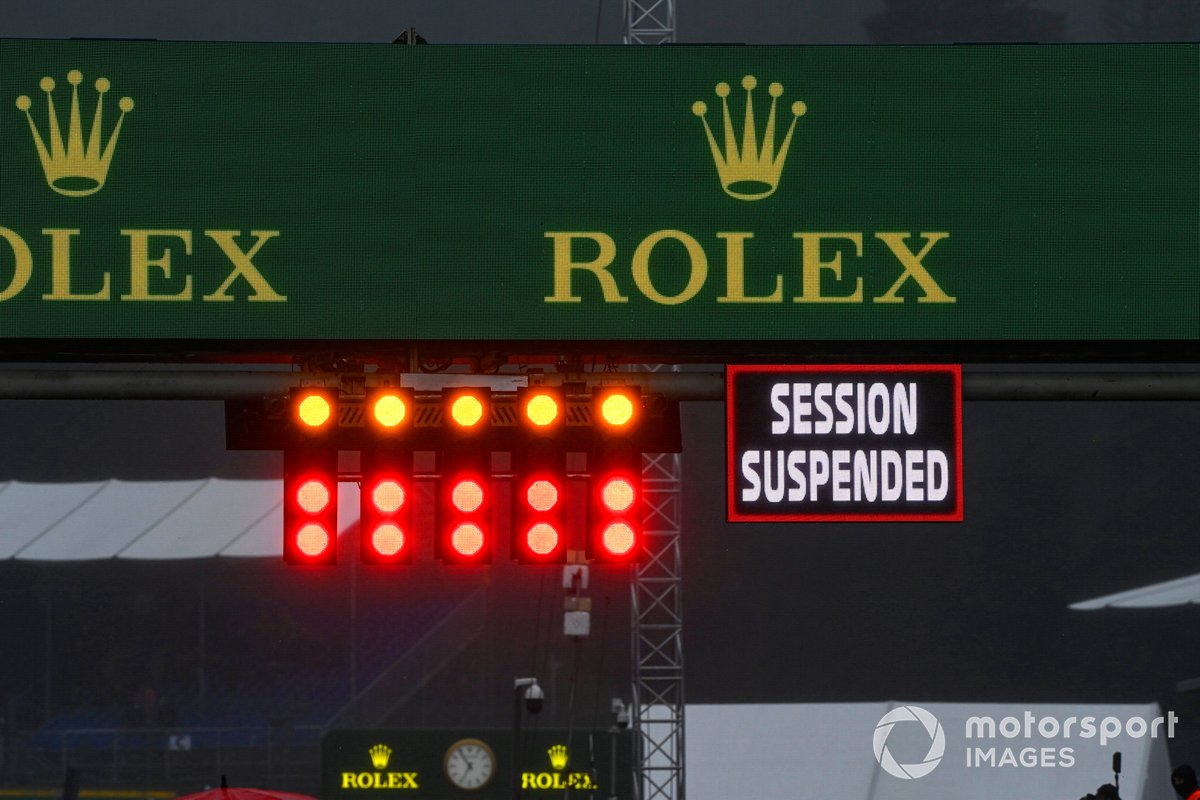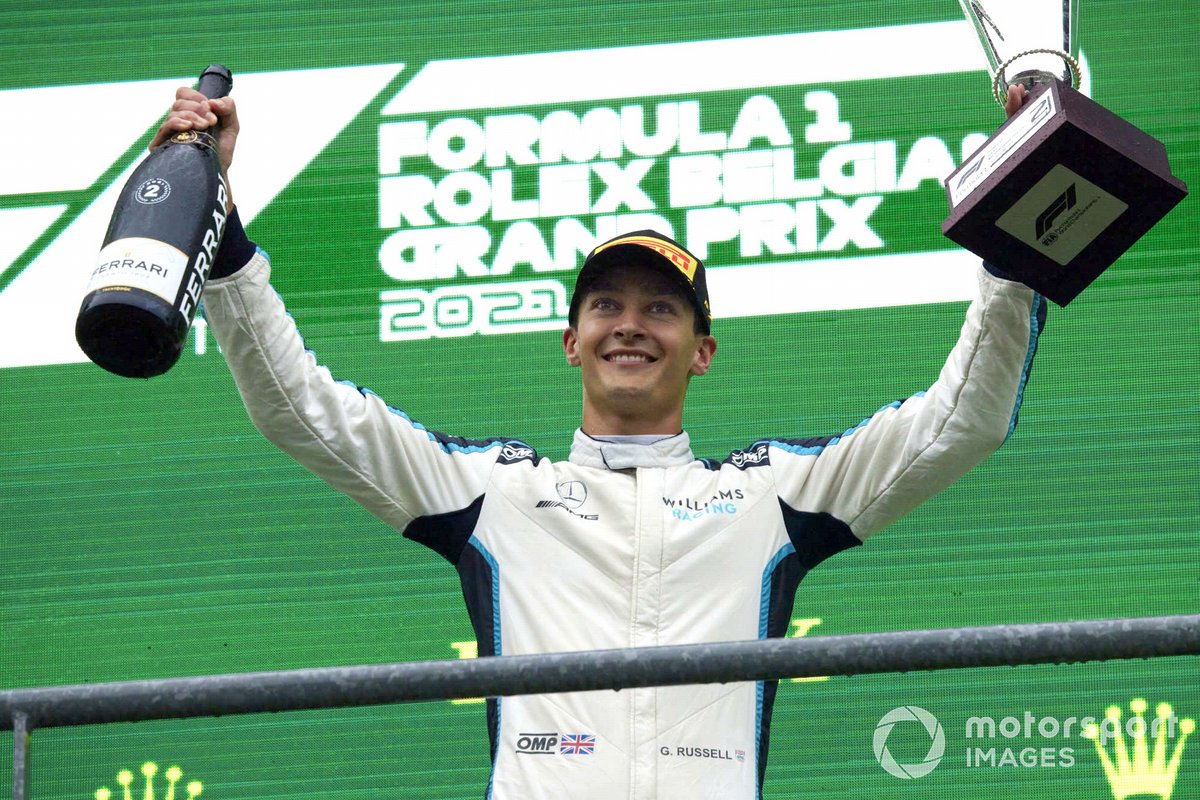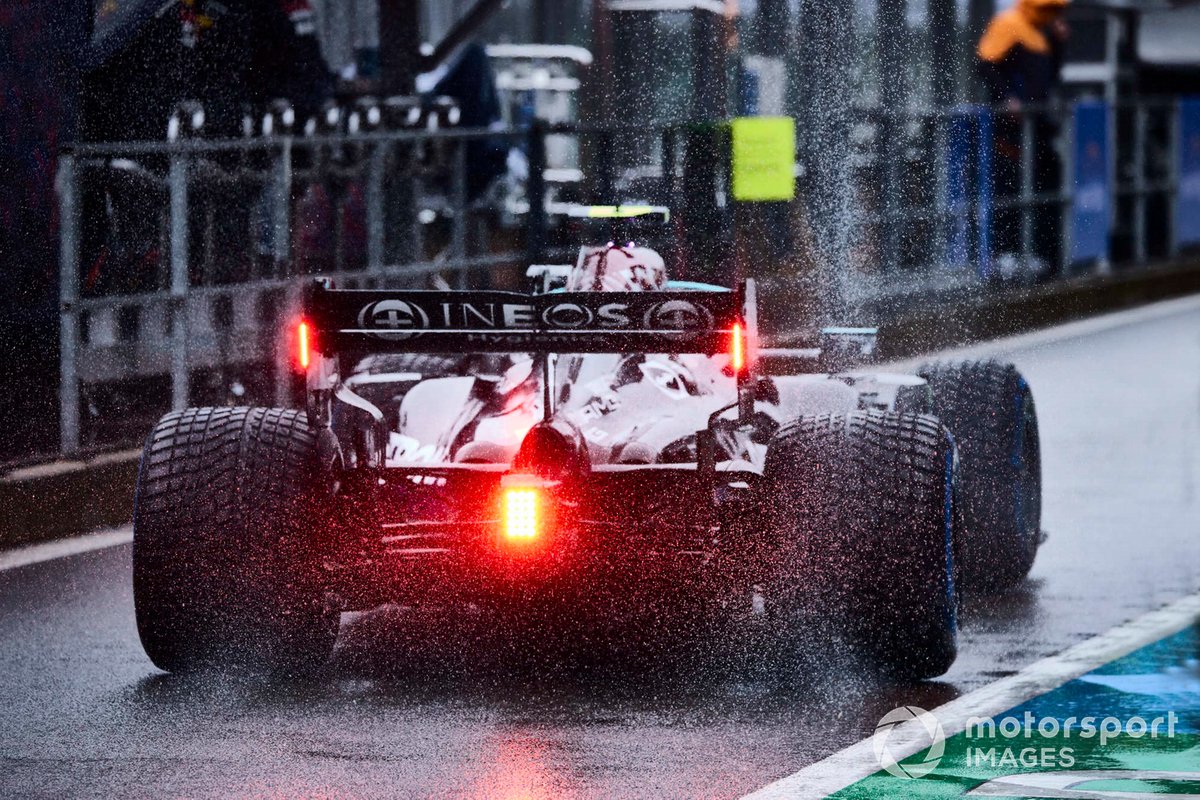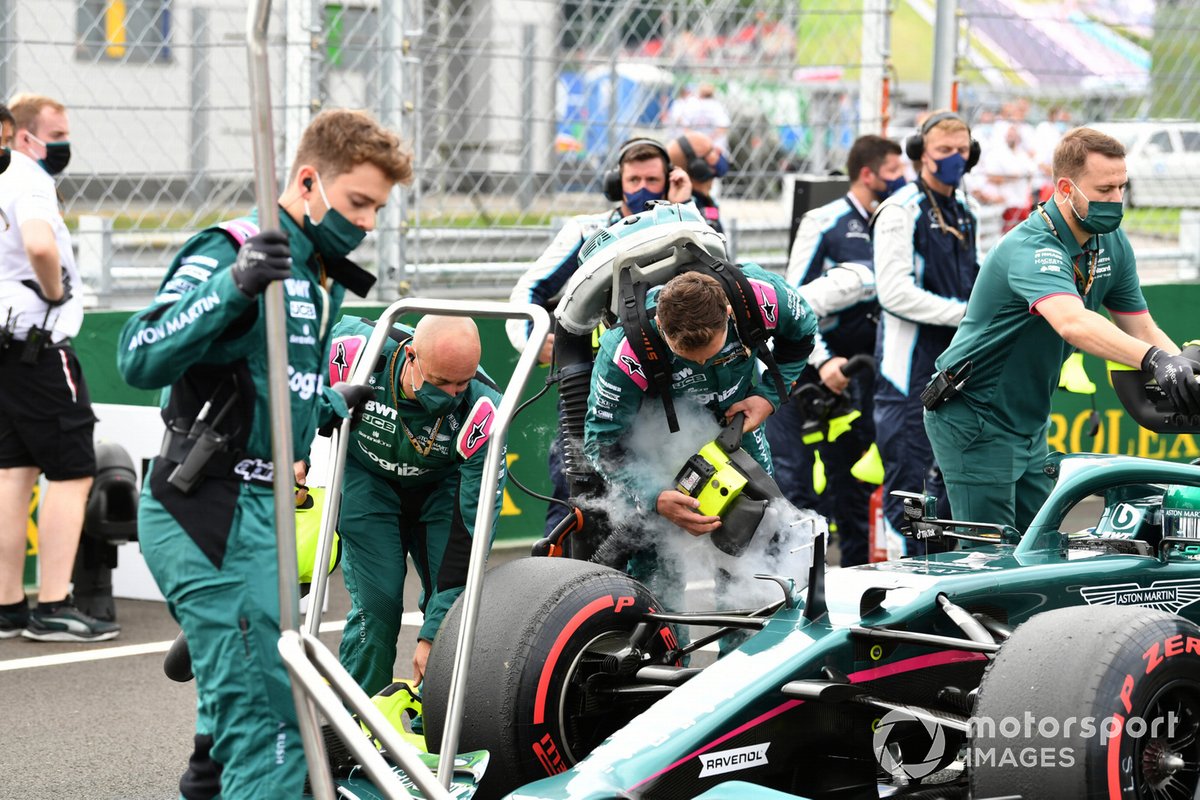Torrential rain and severe delays reduced the Spa race, typically one of the highlights of the season, to a two-lap procession behind the safety car, thus satisfying the requirement to award half points and declare a result for an affair one would not want to dignify by referring to as a true “race”.
It was a difficult day for F1, one where it faced challenges posed by a factor that was entirely out of its control, such is the nature of Mother Nature.
But it did lead to questions about the handling of such scenarios, particularly as seven-time world champion Lewis Hamilton came out swinging afterwards, calling it a “farce” and that it was “all a money scenario”.
Here are 10 things we learned from the Belgian Grand Prix.
 Safety Car, Max Verstappen, Red Bull Racing RB16B
Safety Car, Max Verstappen, Red Bull Racing RB16B1. F1 needs to ditch its two-lap minimum rule
The weather is something that F1 cannot control. While it has faced delays in the past due to the elements, dealing with torrential rain, typhoons and even some snow in pre-season testing, it has never come on race day. F1 has got lucky – until it didn’t.
Mercedes F1 boss Toto Wolff called Sunday a “freak” day for F1, which is accurate. It is the kind of eventuality that you can never plan for until it actually happens. At that point, you then need to react.
The weather forecast made it clear from quite early on that we were never going to get a true ‘race’ at Spa on Sunday. But the fact that just two laps were needed to make the race official and award half points dangled a carrot in front of those in charge, giving us, by technicality, a race. Race director Michael Masi denied the laps done behind the safety car were done purely to meet the two-lap minimum, saying they were “aiming for a window” to try and get some racing in.
Read Also:
- F1 CEO Domenicali: No commercial pressure to start Belgian GP
But the real issue here is the two-lap minimum rule itself. It has long sat in the regulations without issue, as it has never been met or needed, with the previous shortest race in F1 history being the 14-lap Australian Grand Prix in 1991. Yet what happened on Sunday showed that, if we do award points, then there needs to be a change to the regulations.
If we need two-thirds distance for full points, then how about one-third distance or 25% distance to award half-points? It seems silly that what happened after 6pm on Sunday constituted a ‘race’ under the regulations, leaving everyone feeling rather empty afterwards.
F1 boss Stefano Domenicali is set to discuss possible rule changes with the team bosses in the wake of what happened on Sunday. Hopefully such a provision is never required again, but in the event it is, F1 can hopefully learn from this situation.
 Session suspended sign above the grid
Session suspended sign above the gridPhoto by: Mark Sutton / Motorsport Images
2. In fact, a lot of the rulebook needs to be simplified
One thing that became painfully clear both through the rain delay and after the race is how complex and tangled F1’s rulebook is right now.
As the podium ceremony began and the sparkling wine was being sprayed – a topic we’ll get to later – questions started to be asked about the validity of the race result, given the red flag count back rule meant the result was taken from the end of lap one.
The FIA clarified that because race winner Max Verstappen had crossed the control line three times, he had met the minimum requirement under the regulations, despite the one-lap classification seemingly contradicting the need for two laps to be completed.
During the red flag, there was also confusion about when the race had started, if it had started at all. Was it 3pm or 3:25pm local time when the three-hour rule kicked in? It wasn’t until Masi clarified this over team radio after a question from Mercedes that it became clear where things stood.
Read Also:
- F1 set for talks over rule changes after Belgian GP “farce”
There was also the confusion over Sergio Perez’s participation in the race after his crash en route to the grid. Masi initially told Red Bull that it could not repair his car during the delay, only for sporting director Jonathan Wheatley to challenge this and, after Masi met with the stewards, be informed that he could get back in the race. But then there were questions about how many laps down he may be, again linking back to what constituted a race “start”.
Just as with the two-lap rule, the events at Spa on Sunday will hopefully lead to reviews of the relevant rules to ensure there is greater clarity for everyone.
 Michael Masi, Race Director
Michael Masi, Race DirectorPhoto by: Jerry Andre / Motorsport Images
3. Race control deserves credit for how it handled things
There may be a huge amount of frustration over the awarding of points and the complexity of the rule book, but in their approach to the race, Masi and his team in race control deserve a pat on the back.
This was, again, a freak situation that F1 could do little about. The rain just kept coming and coming, making it an impossible task for race control. It looked for windows to get some kind of running in, and although cynicism over the two-lap run at the end is understandable, there was legitimately a break in the weather that seemed to be the best opportunity.
The new FIA/team radio broadcast feature on F1’s TV feeds really came into its own on Sunday. We got to hear Masi talking to figures from Red Bull, Mercedes, Ferrari and McLaren as they put queries to him, helping us gain a better understanding of what was going on. Before, we’d have been solely reliant on race control’s formal updates, some of which were to say there would be another update…
Masi has a difficult job, and there have been points in the past couple of years were decisions have rightly been questioned. But it’s hard to see what more he could have done to give us any kind of race on Sunday, with the culprit of the two-lap shambles being the rulebook itself.
 Fans under umbrellas during a red flag period
Fans under umbrellas during a red flag periodPhoto by: Steven Tee / Motorsport Images
4. The fans need to be looked after over ticket refunds
Lewis Hamilton’s post-race comments were punchy, and are unlikely to have gone down too well with F1 itself as he criticised the series for making “a bad choice”. But throughout everything he said, he had one thing in mind: the fans.
With little else to show during the delay, the TV cameras picked out fans sat in their raincoats and camping chairs, braving the elements with a beer in one hand and a portion of frites and mayo in the other. It was everything we love about the Spa fans, who sadly were not rewarded with anything to watch on-track.
Hamilton said he hoped that fans would get their money back after being “robbed” of a race, but F1 boss Domenicali seemed to skate around the subject post-race, saying it would be a discussion with the promoter. After all, F1 did technically provide a race.
A full refund may be a big hit for the race promoter to stomach, and given fans got all of the scheduled action on Friday and Saturday, there is grounds to say the three-day tickets were at least partly fulfilled.
But hopefully some common sense does kick in. Even if fans who attended the race on Sunday receive some kind of credit towards a ticket in 2022, it would be some reward for their stoic attitude through Sunday’s downpour.
 George Russell, Williams, 2nd position, with his trophy and Champagne
George Russell, Williams, 2nd position, with his trophy and ChampagnePhoto by: Steve Etherington / Motorsport Images
5. Russell’s podium was the only bit of good news on Sunday
George Russell rarely does things in a conventional way, so why would we have expected his first F1 podium to be any different?
After his heroics on Saturday, nailing his lap in Q3 to take an astonishing second place on the grid for Williams, Russell commented that it might be quite nice for F1 to award points for qualifying.
In the end, it practically did. While second place and nine points was perhaps a bit generous, it was nice to see his astonishing wet-weather lap get some kind of reward.
Read Also:
- Russell: “Doesn’t matter” how maiden F1 podium arrived
Toto Wolff said Russell’s lap on Saturday made little difference to his future, given a) we know what he’s already capable of, and b) Wolff has already made his decision.
But it was the kind of lap we will look back on in years to come when Russell inevitably has enjoyed a highly successful F1 career, seeing it as a sign of early greatness.
 Antonio Giovinazzi, Alfa Romeo Racing C41
Antonio Giovinazzi, Alfa Romeo Racing C41Photo by: Jerry Andre / Motorsport Images
6. …unless you are Alfa Romeo, who was the big loser
Russell’s podium was far more than a simple quirk for Williams, serving as a big result that should practically clinch it eighth place in the constructors’ championship, giving it plenty to celebrate.
Williams has scored points with both cars for two weekends in a row now, with Nicholas Latifi being classified ninth on Sunday. A total of 20 points has created a 17-point gap to Alfa Romeo in the standings, making the fight for eighth all but over.
Alfa Romeo was understandably upset about the result, issuing a statement on Monday saying that no race should have taken place and that “this outcome hurts us all” – which is not strictly true, as it didn’t hurt Williams.
The fight for the small places in the constructors’ championship may seem like no big deal from the outside, but to the teams involved, it is everything. There is a sizeable amount of prize money on offer between eighth and ninth. Even after Williams’ haul in Hungary, Alfa Romeo had confidence it could overhaul them. Now? The odds look incredibly slim.
 Max Verstappen, Red Bull Racing, 1st position, sprays Champagne on the podium
Max Verstappen, Red Bull Racing, 1st position, sprays Champagne on the podiumPhoto by: Alastair Staley / Motorsport Images
7. The podium ceremony celebrations were a little tone deaf
Another big question both fans and teams had once the race had been officially called after the two laps behind the safety car was whether there would be a podium ceremony.
Masi informed Red Bull there would “absolutely” be one, in line with the usual protocols given there had officially been a race, with the top three finishers going to parc ferme before going up onto the podium.
Russell and Williams in particular had something to cheer about, marking the team’s first podium since Baku 2017. Comparisons were drawn to the infamous 2005 United States Grand Prix, when Tiago Monteiro and Jordan celebrated their third-place finish while Ferrari kept things as low key as possible on a bad day for F1.
But the celebrations seemed a little tone deaf. It didn’t feel right to see the sparkling wine being sprayed almost as normal. Verstappen and Russell hardly went crazy celebrating, but it still seemed odd. Hamilton immediately put his trophy down after being presented it.
A simple clink of the bottles and a little spray might have been a better read of the situation.
 The Safety Car Max Verstappen, Red Bull Racing RB16B, and George Russell, Williams FW43B
The Safety Car Max Verstappen, Red Bull Racing RB16B, and George Russell, Williams FW43BPhoto by: Jerry Andre / Motorsport Images
8. Spa’s safety changes really can’t come soon enough
Sunday’s events capped off a fairly uneasy weekend as a whole at Spa that saw two major accidents at Eau Rouge reopen the debate about the track’s safety standards.
Two years on from the Raidillon accident that claimed the life of Anthoine Hubert and left Juan Manuel Correa with serious injuries, and just weeks after another major accident in the Spa 24 sportscar race, there were two big shunts at the same complex that reignited the debate.
A six-car pile up in W Series at Eau Rouge resulted in two drivers being hospitalised, but thankfully both were swiftly discharged. McLaren’s Lando Norris then crashed heavily in wet weather at the start of Q3, sparking an angry reaction from Sebastian Vettel, who had been calling for a red flag just moments earlier.
Through all of the calls for safety changes at Eau Rouge/Raidillon, there was a reminder that they are planned and on the way for 2022 as part of Spa’s €80 million redevelopment programme. The addition of gravel should slow the corner down a bit, as well as preventing cars from bouncing back towards the circuit.
Change is on the way, and they cannot come soon enough. Spa is a glorious track that holds a special place on the F1 calendar, but its recent tragedy and recurring incidents are unwanted reminders of the need for alterations.
To quote F3 world feed commentator Alex Jacques in his intro ahead of Saturday’s race: “You pay tribute with words, but you honour with action.”
 Valtteri Bottas, Mercedes W12, in the pit lane
Valtteri Bottas, Mercedes W12, in the pit lanePhoto by: Steve Etherington / Motorsport Images
9. Mercedes is nearing an announcement, but wants all futures resolved
The wait for the first major domino in next year’s driver market continued at Spa as Mercedes made no announcement about its second seat for 2022.
George Russell and Valtteri Bottas said there was “no news to share” in Thursday’s FIA press conference – having been paired together – but were coy over if a decision had already been made.
Toto Wolff said on Saturday that he had made his decision, and clarified on Sunday that he meant personally, and that “I’m not the only one that is involved in this decision”.
So why no announcement? There are still more things to get finalised and sorted, with one factor being the need to resolve everyone’s future and leave nobody hanging.
When asked by Motorsport.com if he wanted both Russell and Bottas to have their futures sorted before making an announcement, Wolff replied: “Yes. And it’s not only our call, but there are other parties involved and you have to always proceed with respect and with diligence.” He later added: “It’s purely a question of having everybody aligned and contracts signed.”
We’re getting closer to a Mercedes announcement, and with Sergio Perez and Fernando Alonso’s confirmations arriving at Spa, the driver market is now coming together. Williams and Alfa Romeo are the hot seats to keep an eye on.
 Mechanics on the grid with Lance Stroll, Aston Martin AMR21
Mechanics on the grid with Lance Stroll, Aston Martin AMR21Photo by: Mark Sutton / Motorsport Images
10. The revised calendar will push F1 personnel to their limits
One announcement that did arrive at Spa was an update to the 2021 calendar, which has now fallen to 22 races after plans for 23 events were finally scrapped.
One fewer event is good news, right? Not entirely. Some date tweaks have created a fairly brutal travel schedule to end the year, running five races in six weeks across Mexico, Brazil, a TBC likely to be Qatar, Saudi Arabia and Abu Dhabi.
The Mexico-Brazil-Qatar triple-header will go some way to solve F1’s red list issue for UK personnel, requiring those travelling from Brazil to spend 10 days elsewhere before going home to avoid government hotel quarantine. This will mean having at least three extra days in Qatar before going home – only to then return to the Middle East about six days later for the race in Saudi Arabia.
More racing is good for fans and good for drivers. But for the men and women working on the teams and elsewhere in the series, the end of this year is going to be the most brutal run yet, reopening the debate about the human cost of such a congested calendar even with the necessities forced by the COVID-19 pandemic.
 Nicholas Latifi, Williams FW43B, Carlos Sainz Jr., Ferrari SF21
Nicholas Latifi, Williams FW43B, Carlos Sainz Jr., Ferrari SF21Photo by: Mark Sutton / Motorsport Images

